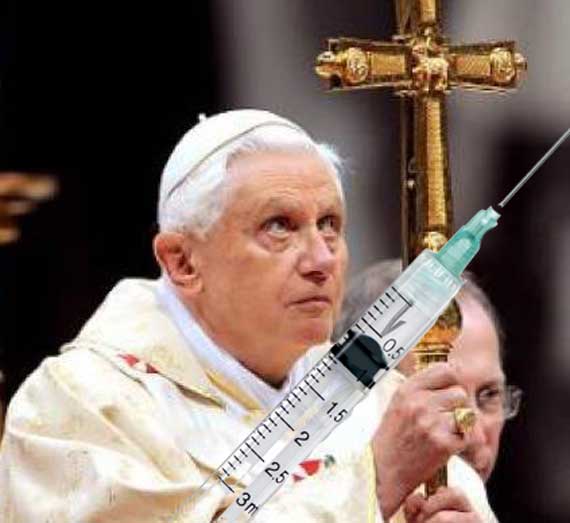
The Supreme Pontiff Benedict XVI has made the Catholic Church’s position on anabolic steroids and performance-enhancing drugs official – the use of steroids is incompatible with “Christian values.” The Pope has repeatedly condemned doping in sports since he was elected the Sovereign of the Vatican City State and leader of the Catholic Church in 2005. But it seems that the Catholic Church has decided to become more vocally anti-steroid in recent weeks as it addressed the Lance Armstrong doping scandal.
Melchor Sánchez de Toca y Alameda, head of the Pontifical Council for Culture’s department of Culture and Sport, told the Catholic News Service on January 16, 2013 that Armstrong’s doping was reflective of the “rotten” state of cycling.
“It’s a world that is rotten, all of cycling, even soccer.”
Professional sports people “have become a commodity that are subordinate to the free market and, therefore, to profit,” he told Catholic News Service.
Instead of sports being an activity that builds important values, respects human dignity and helps shape the whole human person, “it has reduced people to merchandise”, he said. […]
The practice is especially rampant in cycling, he said, adding: “It’s very sad.”
The comments were made on the eve of two-night broadcast of Lance Armstrong’s doping confessional on Oprah’s “The Next Chapter”.
The Pope recently urged athletes to avoid the temptations of anabolic steroids when he spoke to the Italian Olympic and Paralympic teams at Clementine Hall of the Apostolic Palace in December 2012.
“Pressure to win good results should never prompt you to take shortcuts as happens with doping,” said Pope Benedict XVI. “Let the same team spirit be a spur to avoid these blind alleys, and also be a support to those who realize they have made mistakes, so that they feel welcomed and helped.”
Pope Benedict XVI has apparently made the anti-doping and anti-steroid agenda one of his priorities. The Pontifical Council for Culture established its ‘Culture and Sport” section in June 2006 in direct response to various scandals encompassing sport.
The basis for the Church’s anti-steroid and anti-doping position is the harm that anabolic steroids allegedly cause the body. Pope Benedict XVI explained the connection in a message to Cardinal Stanislaw Rylko and participants in a seminar entitled “Sport, education and faith: a new season for Catholic sport associations” on November 6-7, 2009.
“Thus it is necessary”, the Pope adds, “that in our own time – when there is a pressing need to educate the new generations – the Church should continue to support sport for the young, making full use of sporting activity in its positive aspects such as, for example, the capacity to simulate competitiveness, courage and tenacity in pursuing goals, while avoiding, however, any tendency that disfigures its nature with practices that can even damage the body, as in the case of doping“.
In recent weeks, it seems that the Church is attempting to latch onto the publicity of the Armstrong doping scandal to spread its anti-steroid message. The decision to jump on the anti-Lance Armstrong bandwagon may not be a coincidence.
Armstrong has never hidden his distrust of organized religion from the public. Nor does he not identify himself as a Christian and nor feel the need to believe in the Christian god. The fact that a non-Christian could defeat cancer and win seven Tour de France races had irked many “believers”. As a result, many “Christians” have celebrated his downfall.
Armstrong wrote about his spiritual beliefs in his autobiographical book “It’s Not About the Bike: My Journey Back to Life“:
“If there was indeed a God at the end of my days, I hoped he didn’t say, ‘But you were never a Christian, so you’re going the other way from heaven.’ If so, I was going to reply, ‘You know what? You’re right. Fine.'”
Perhaps the Catholic Church feels that the Lance Armstrong presents the perfect opportunity to spread their anti-steroid morality while highlighting the downfall of a person who was one of the most beloved non-Christians in sports.

About the author
Millard writes about anabolic steroids and performance enhancing drugs and their use and impact in sport and society. He discusses the medical and non-medical uses of anabolic-androgenic steroids while advocating a harm reduction approach to steroid education.

Leave a Reply
You must be logged in to post a comment.